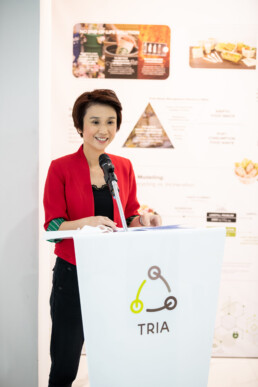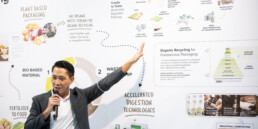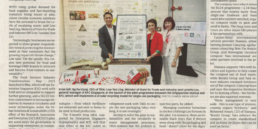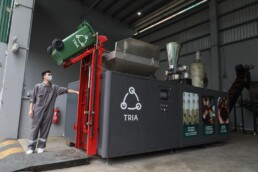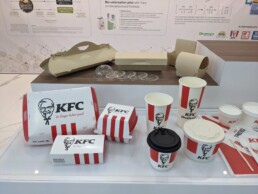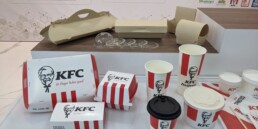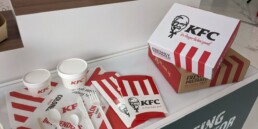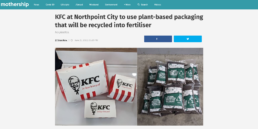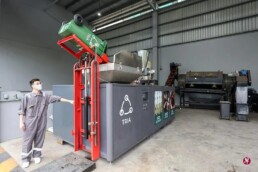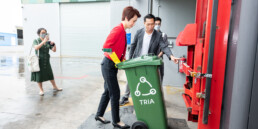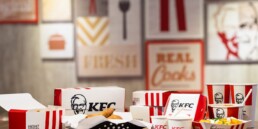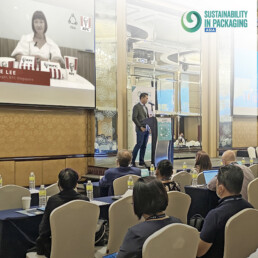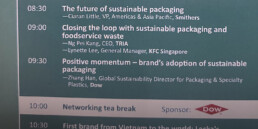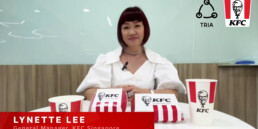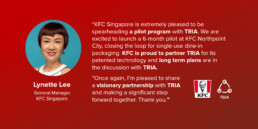Tatler | Sustainable packaging
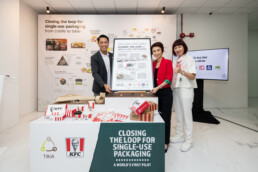
Tatler Singapore | Sustainable packaging firm TRIA works with KFC SG
The Singapore-based company and the fast-food chain embark on a six-month pilot programme to turn waste into nutrition for agriculture using TRIA’s patented technology. Sustainable packaging company TRIA has partnered KFC Singapore on a six-month pilot programme to convert the fast-food chain’s food waste and single-use packaging into farm fertiliser. KFC will test out TRIA’s solution at its outlet at Northpoint City mall in Yishun, swapping out its regular packaging with TRIA’s proprietary Neutria foodware, which is compostable and made using plant-based materials such as corn. The outlet’s packaging and food waste will be collected and delivered to a recycling plant. There, the waste will be thrown into TRIA’s patented Bio24 digester, which breaks it down into smaller pieces and enables natural enzyme action in order to produce compost within 24 hours.
https://www.tatlerasia.com/power-purpose/gen-t/sustainable-packaging-firm-tria-to-turn-kfc-packaging-and-food-waste-into-farm-fertiliser
BT | Circular economy solutions: Minister Low Yen Ling

The Business Times | Circular economy solutions: Minister Low Yen Ling
There’s potential for F&B brands to innovate and become front-runners in sustainability, says Minister of State for Trade and Industry, Ms Low Yen Ling. TRIA Pte. Ltd. is a “closed-the-loop” company for packing solutions – working clients from concept, development to manufacturing as well as in #lifecycle #carbon assessments, to develop an end-to-end ecosystem that helps them meet their #sustainability goals. Singapore Enterprise TRIA partners with fast food giant, KFC to launch a pilot program that is a first of its kind. This program brought together strategic partners such as catalist-listed #environmental services providers Ansari – Shanaya Group, urban farming pioneer ComCrop, Agribusiness consulting firm The The Boralis Group Group, and Norwegian chemical company Yara International are other partners involved in the pilot.
This pilot is supported by Enterprise Singapore.
“TRIA Pte. Ltd. has been strengthening its #innovation capabilities over the years, and this collaboration with KFC will validate a food waste #circular model, which will be in line with the global push for sustainability efforts. Enterprise Singapore will also continue to support companies with promising solutions like TRIA to expand into international markets,” said Soh Leng Wan, assistant CEO (manufacturing and engineering) of EnterpriseSG.
Click here to read the full article.
TODAY | 'Clever solution': S'pore firm launches pilot
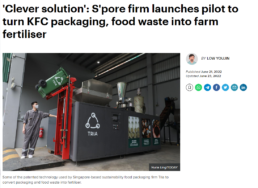
- Packaging firm Tria and fast-food chain KFC have begun a six-month-long pilot programme
- The collaboration between the two companies will see it turning both single-use food packaging and food waste into fertilisers for farmers
- This will be done through a technology patented by Tria
SINGAPORE — Singapore-based sustainable food packaging firm Tria has begun a six-month-long pilot with fast-food chain KFC Singapore to turn single-use packaging and food waste into agricultural fertiliser. It is an endeavour that they are claiming is a world first.
Mr Ng Pei Kang, chief executive officer of Tria, said during an event launch for the pilot on Tuesday (June 21) that the biggest challenge when it comes to recycling food packaging is segregating the food waste from the containers.
The cost of segregating the two, he said, can be up to five times the cost of the packaging itself, so it does not make business sense for food-and-beverage firms to make an attempt at recycling.
“What we are trying to do is solve the problem of segregation… by avoiding segregation,” he said.
As part of the pilot, KFC will be using its outlet at Northpoint City mall in Yishun to testbed Tria’s solution. The outlet serves food in Tria’s proprietary Neutria foodware — which is essentially compostable packaging made from plant-based material such as corn or sugarcane fibres.
Mr Ng told TODAY that customers will not be paying more as a result of this programme.
HOW IT WORKS
The packaging and food waste from the KFC outlet is collected and sent to a recycling plant where it is dumped together into a machine, a type of composter patented by Tria, that breaks the waste down into smaller components before microbes digest it.
This turns the waste into fertiliser, in a process that takes about a day.
Mr Ng added that the machine is able to sift out anything that is inorganic, such as metal or plastic that gets into the food and packaging waste.
One tonne of waste is able to yield about 200kg to 300kg of fertiliser.
Mr Ng eventually hopes to sell the fertiliser to farmers in Singapore and Malaysian once the company is able to put out a consistent supply.
For now, the success of the pilot hinges on three factors.
KFC told TODAY, however, that the firm will gather feedback on the packaging from both the outlet’s team as well as patrons.
The second factor involves the waste collection process. In general, mall operators are responsible for dealing with the waste collection for their tenants.
For the pilot, KFC’s general manager Lynette Lee said during the launch that the firm has been able to come to an arrangement with Northpoint City’s operator, Frasers Property, to facilitate the collection of the outlet’s food waste and have it sent to Tria.
Mr Ng said that the team will be exploring to see how this “waste-owner model” can be extended, and whether it means Tria will eventually be able to represent KFC at all malls in terms of waste collection.
The final factor relates to whether the fertiliser that the firm produces contains the right nutrients that farmers need to suit different farming seasons.
Mr Ng said that Tria is working on this with one of its partners, Yara, a Norwegian fertiliser company.
Being able to create a fertiliser that is of a commercial grade suitable for growing food on a mass scale will be the “chapter that will unlock new growth potential” for Tria, Mr Ng added.
When asked if operational costs will also be looked at, he responded by saying that the pilot is more of a “qualitative assessment in terms of functionality”.
“It’s a bit too early to be considering operational costs because there is no economy of scale (right now).”
“With the success of our partnership, we hope to take the lead and bring together a zero-waste closed loop recycling concept to the food and beverage industry. We believe this will contribute positively to the Singapore Green Plan.
KFC Singapore”
Once the pilot is over, KFC said that it will work with Tria to assess the scalability of the initiative across all 80 of its branches in Singapore as part of the chain’s “continued efforts towards environmental sustainability”.
“With the success of our partnership, we hope to take the lead and bring together a zero-waste closed loop recycling concept to the food-and-beverage industry. We believe this will contribute positively to the Singapore Green Plan.”
Aside from bringing on board other food-and-beverage operators, Mr Ng also hopes to introduce Tria’s closed-loop solution to caterers and even event organisers.
There are, however, no plans to focus the business for residential use yet. This is because it involves the national waste infrastructure, which is “more complex” because a system needs to be in place to cater for the whole of Singapore, Mr Ng said.
Ms Low Yen Lin, Minister of State for Trade and Industry, said during a speech at the event that “clever circular economy solutions” such as the collaboration between Tria and KFC have the potential to break the cycle of escalating waste.
“Growing consumption in Singapore has led to greater amounts of packaging and food waste,” she added. Yet, recycling rates remain low.
The National Environment Agency has said that Singapore’s overall recycling rate was 55 per cent last year, marginally higher than 52 per cent in 2020 — the lowest in the decade.
Singapore has repeatedly sounded the alarm on the need to improve the nation’s recycling rate since its only landfill on Pulau Semakau is expected to run out of space by 2035.
On the collaboration, Ms Low said that it not only reduces pollution by lowering the amount of waste being burnt or sent to landfill, but also “contributes to a greener environment and brings (Singapore) closer to our Zero Waste goals”.
Read full article here: https://www.todayonline.com/singapore/spore-firm-kfc-pilot-turn-packaging-food-waste-fertiliser-1929816
Mothership | KFC to use plant-based packaging
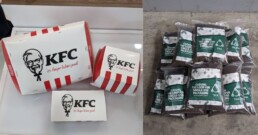
If you’ve dined at Northpoint City’s KFC outlet in June 2022, you might not have noticed anything different about the experience. But not only does the outlet have a new type of plant-based food packaging, none of the food or packaging waste will head to the incinerator.
Closing the loop
For the next six months, the waste produced by KFC patrons at Northpoint City will go towards feeding a special waste digester in Tuas instead. This is part of the world’s first pilot for closed-loop organic recycling of single-use packaging and waste. The digester takes in both food waste and packaging and transforms it into farm-ready fertiliser in just 24 hours. This entire end-to-end system is practically zero waste. To consumers though, the entire range of food packaging feels and looks exactly the same.
From plant to packaging to fertiliser
The proprietary system was developed by innovative foodware company and local start-up TRIA. They launched the pilot programme with KFC Singapore on June 1, a collaboration that was facilitated by Enterprise Singapore.
“Globally, no fast food brand has managed to close the loop for dine-in single-use packaging,” said a joint press release by KFC and TRIA. The plant-based packaging is a mixture of paper and bioplastics, which is made from sugar-based plant crops like industrial corn and leftover sugarcane pulp sourced from the U.S., Thailand and Taiwan. The fertiliser made by the digester will go towards local agriculture to support Singapore’s 30 by 30 food security goal or otherwise exported to Malaysia. TRIA CEO Ng Pei Kang told Mothership the research for the technology has been underway for about nine years, and just under S$1 million has been funnelled into its development.
Food waste and packaging recycled together
KFC general manager Lynette Lee said that the need to review how food packaging can be more environmentally sustainable was partially driven by the pandemic. “During the past two years of the Covid pandemic, we saw a shift towards food takeaway and delivery. Instead of less packaging, the food industry saw an increased usage of packaging, be it plastic or paper. Even when regulations are now relaxed, consumers have grown to love the convenience of these services.”
Food packaging is notorious for being hard to recycle, and one main challenge is segregating it from food waste. It is commercially unviable as recycling food packaging would cost five times more than the packaging itself, said Ng. TRIA’s patented technologies to break down the plant-based packaging allow both to be processed together without segregation. At any one time, the food digester can turn 1,000kg of food waste and packaging into 200 to 300kg of fertiliser. Ng shared that he sees potential for the closed-loop system to be used for catering events and on airlines. TRIA also has plans to scale up its closed-loop solution to KFC outlets locally and worldwide, as well as to other global foodservice brands. Source: https://mothership.sg/2022/06/kfc-plant-based-packaging/
联合早报 | 起步公司将可持续包装与食物垃圾回收再循环
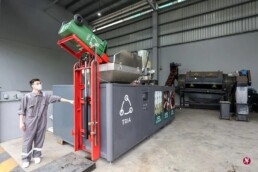
联合早报 | 起步公司将可持续包装与食物垃圾回收再循环
本地起步公司与肯德基合作展开试行计划,采用以植物为原材料的食物包装,并将这种可持续的包装与食物垃圾一起回收再循环,减少污染。食品包装起步公司TRIA本月起和肯德基展开为期六个月的试行计划,为位于纳福城(Northpoint City)的肯德基快餐店提供可持续包装,并回收使用过的包装和食物垃圾进行再循环。
ST | S'pore firm TRIA partners KFC
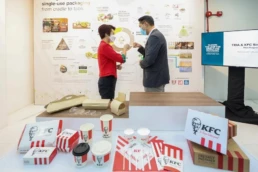
The Straits Times | S’pore firm TRIA partners KFC
Source: The Straits Times – Luke Pachymuthu, Senior Correspondent
Mr Ng told The Straits Times on the sidelines of the official launch event in Tuas that the six-month pilot would also involve close collaboration with Norwegian fertiliser giant Yara International to help it assess the commercial viability of scaling the pilot to make a product that is compliant with international global standards. “With Yara, we will look at how we can further improve and enhance the product such that this becomes commercial grade fertiliser, making this a full loop right from cradle to the farm,” said Mr Ng, adding that the urgency to find sustainable alternative sources of fertilisers was now more pronounced following the Russia-Ukraine conflict.
Western sanctions on Russia, a major exporter of fertilisers, have disrupted shipments of these natural resources globally, forcing farmers worldwide to scale back usage and reduce the amount of land they use for growing essential crops such as wheat, corn and rice. “The TRIA-KFC organic recycling pilot is an important example of projects which can help smallholder (farmers who work on plots that average 1.2ha) and commercial farmers and governments achieve food security, while ensuring sustainability in Singapore and other nations around the world,” said Ms Marisa Soares, vice-president – Farming Solutions, Africa and Asia at Yara International. She added that scaling such projects would require more partners within the food chain getting more aggressive in adopting sustainable solutions, similar to KFC Singapore. “This will require investment from all concerned, but we aim to prove that closing the loop in this ecosystem can be financially sustainable, while having a positive impact on our natural resources,” she said.
“Should we be successful in this project, we will leverage our regional and global presence to create a marketplace for this solution, leveraging our connectivity and presence on the farm to support farmers and to help them adopt and use new solutions that would have a positive impact – not only on the soil, but also on crops and on helping to reduce carbon emissions.”
Mr Ng said TRIA will work alongside Singapore-listed recycling and environmental services company Shanaya to collect the waste bags from the KFC outlet, which will then be transported to the waste processing facility currently located at the premises of Shanaya’s waste management plant in Tuas. By recycling food waste that would otherwise have to be incinerated, the collaboration with KFC helps to drive greater sustainability in the food services industry and support the Singapore Green Plan 2030, Mr Ng said. “Such ownership is imperative in driving circular food systems because we know that circularity cannot be done in isolation,” said Mr Ng, while encouraging potential partners interested in shaping the future of circular food systems to come forward and team up with it.
KFC Singapore’s general manager Lynette Lee said it will review the results and assess the viability of scaling the programme across all its restaurants in Singapore at the end of the pilot. “Through this partnership, KFC Singapore aims to continue our efforts for the environment and take the lead to bring together zero waste close-loop recycling concept in the food and beverage industry,” said Ms Lee.
Minister of State for Trade and Industry Low Yen Ling, the guest of honour at the event, emphasised the importance of innovation in Singapore accomplishing its zero waste goals. “Clever circular economy solutions like what we see today have the potential to break the cycle of escalating waste. Innovation is critical for sustainable development, especially with rising global demand for food supplies and fast-depleting resources,” she said.The collaboration was facilitated by Enterprise Singapore under the Enterprise Sustainability Programme launched in 2021 that supports Singapore companies to build capabilities and capture new opportunities in the green economy.
Photos: TRIA, Lianhe Zaobao, The Straits Times
Click here to read the full article.
Sustainability in Packaging Asia Conference
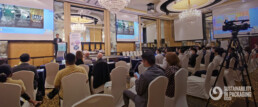
TRIA was invited to speak at the recent Sustainability in Packaging Asia 2022 Conference, sharing the stage with our partner, fast-food giant KFC, represented by Lynette Lee, General Manager of KFC Singapore.
We shared about the upcoming pilot between KFC and TRIA to close the loop for single-use packaging. This pilot positions Singapore as a front runner in closing the loop for single-use packaging, and demonstrating that circularity can be achieved for the Quick Service Restaurant (QSR) sector. Watch this space for our upcoming launch next week and looking forward to share more details.
